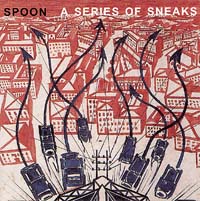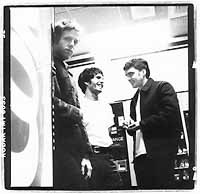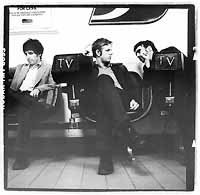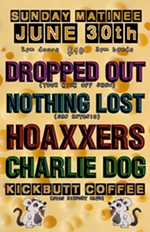Drake Tungsten and His Boy Skellington
By Raoul Hernandez, Fri., Jan. 22, 1999
|
|
This much we know for sure: A cloak-and-dagger bludgeoning of the "alternative rock" sort, Spoon's second LP was unquestionably one of the most dangerous weapons in Austin's musical arsenal last year, if not the most lethal. Menacing the listener with a mouthful of sinister insinuations, accusations, recriminations, A Series of Sneaks steals along the shadowy side streets of an urban nightmare, leaving behind what one sleuth called "a trail of intrigue, confusion, and a lot of unanswered questions." The songs are short, jagged, only three of the LP's 14 tracks clocking in at over three minutes, a hail of riffs raining down over a clanging, clamoring sonic backdrop that sounds like industry in decline. Daniel's voice, as both the group's singer and songwriter, barks ominously as if through the sole, century-old loudspeaker in Big Brother's holding cell. Urgent, insistent, featuring titles such as "The Minor Tough," "The Guestlist/The Execution," "June's Foreign Spell," and "Chloroform," A Series of Sneaks is downright diabolical.
Under the interrogating glare of the media spotlight, asked how he would describe A Series of Sneaks, Britt Daniel -- smart, cagey -- flinches, blinks two or three times, then slumps. Slap him again.
"Uhhh?"
He trails off. Long trail. Like the back nine at the Sahara Country Club. Nothing to do now but take five, maybe. An early Beatles album plays in the background, but the barren walls of Daniel's mostly deserted Hyde Park apartment couldn't care less. They look the other way. The xylophone in the next room, on a stand in front of a desk piled high with stereo components and recording equipment, doesn't remember Daniel's "Dance of the Sugar Plum Fairy" demonstration from five minutes ago.
"Uh ..."
Again with the antacid ad. Get my cigar clipper.
"Uh, it's real rock."
"Real rock"? Is that some kind of a joke, smart guy? You trying to be funny? Go on, mouth off some more. See what that gets you.
"How do I describe it? I don't know. I don't know how to describe it. I'd probably go into how we recorded it. It took a long time to record. It was a tortuous process. I wanted A Series of Sneaks to be more like the Soft Effects EP, which was done real thrown off, done real fast. We didn't put a lot of thought into it, and then it turned into something that I really, really liked, and was really proud of. You know, I wasn't expecting much from it.
"But then with Series of Sneaks, maybe because we knew it would be an album, or maybe because we had more time and money and were doing it in a real studio instead of just in John's [Croslin] garage, we ran into problems. We were thinking it through too much. I think, eventually, we made it a really good record, but it could've been a really shit record."
Finally, some answers. Not very good ones, but at least he hasn't dummied up. As for a "shit record," though, not a chance. During their relatively short recording career, Spoon's musical missteps have been few, bum songs rare, let alone the threat of an entire album's worth. Formed in late 1993, the group, originally Daniel and Greg Wilson (aka Wendel Stivers) on guitar, Jim Eno on drums, and Andy McGuire on bass, was a compelling one from the very start. Releasing a four-song vinyl debut in May '94, The Nefarious EP, Spoon quickly caught the eye of Hole in the Wall regulars and the ear of the local press with their taut sound and tight songs. In 1995, at what was perhaps the height of the alternative rock frenzy, Daniel and company signed a recording contract with the hippest of hip New York indie labels, Matador. A one-way ticket down Easy Street, right? Not so fast.
By the time Spoon's Matador bow, Telephono, hit the streets in 1996, Wilson was long gone and McGuire's legal representation was demanding one-third of the group's advance and publishing royalties following the bassist's acrimonious split with the band (she got both as per the original agreement with her bandmates). Here was Daniel's dream come true, an album on Matador, and already he was without a bassist. Filling in for the interim, Telephono producer and longtime local musician in good standing, John Croslin, toured extensively with the band in support of a full-length debut that garnered generally positive press when not being derided for being a Pixies tribute. Daniel loves that one, though he's too polite to bristle.
Not Telephono. It bristles. With "real rock." A bashing good time with big production values that don't betray its origins in Croslin's garage (or its $3,000 price tag), Telephono comes over the wire like a call to arms, easily one of Matador's more commercial releases. From the relentless demand of the opener "Don't Buy the Realistic" to the High Voltage-era AC/DC intro of the album's first single, "All the Negatives Have Been Destroyed," Telephono just plain rocks, three of the album's best tunes originating on The Nefarious EP in rougher versions, including the slightly Pixilated "The Government Darling," and the the ferocious, barking 'n' biting "Not Turning Off." The album sold all of 3,000 copies.
Typical, that story. Ugly as an ex-wife. Yet Daniel and Eno could at least take comfort in one thing: Spoon had made a major leap in the music industry arc of becoming a viable recording venture, going from local artists putting out their own product to national league hopefuls on a marquee indie with major distribution. Now it was time for a follow-up. That's when Daniel turned up Drake Tungsten and his muscle Skellington.
Born in Galveston 27 years ago, raised in Temple, Daniel grew up in a household rocking to the Beatles and rolling to the Stones, his dad a neurologist father of five who collected guitars even though he wasn't really a practitioner of the instrument ("He was the kind of dad that would wake up and turn on the stereo real loud in order to wake everybody up," says Britt). Judging from the younger Daniel's CD collection, the Beatles won out (could the only Stones title really be Their Satanic Majesties Request?) When he moved to Austin in 1989 to attend UT, Britt tried his own hand at playing guitar, starting a band whose sound landed somewhere between the Beatles' tuneful pop and the Stones' rocking swagger: Skellington.
Quick to local recognition, Skellington ('90-'92), featuring "the very Fripp" guitar stylings of Travis Harnet (Tik-Tok, Futura), was the gleefully "real rock" precursor to Telephono-era Spoon. The songs evinced Daniel's typically droll melodies and Skellington, Skellington Rex, and The Town's Gone Dry, all cassettes, sold the band to those close enough to hear the buzz. The last tape evokes none other than Tom Petty & the Heartbreakers on the first song, before the second, "Bowhead," makes its declaration loud and clear: "You pull me up to tell me I'm Tom Petty and expect me to swallow my pride." Another good album with Daniel's name on it. See. Better still is the demo of a song found at tape's end, "Loss Leaders."
A snappy, upbeat acoustic number, "Loss Leaders" is one of those songs that makes you sit up and start asking questions. Like, who wrote this? It's no "American Girl," just one of those clever little songs that sez homeboy's got the gift. Five years later, when "Loss Leaders" appeared on 1997's Telephono follow-up, Soft Effects EP, it was the best song on the five-song swirl, only now it was a little slower, a little spacier. Like its four companions on the Soft Effects EP, "Loss Leaders" was a departure from most everything on Telephono. It was pop to its core, pop of the variety proliferated by Spoon's Matador labelmates, Guided by Voices. Bob Pollard pop: four-track, home studio songs that yield nothing but melody after catchy melody after irresistible melody. Drake Tungsten-type meanderings, found on a 1996, self-released local cassette (Aha! A Pixies cover) and single sounding suspiciously like another thin, blonde warbler. Tungsten, Skellington, Soft Effects EP. Bingo. A Series of Sneaks.
"I've always written songs like the ones on A Series of Sneaks and Soft Effects," says Daniel, giving up his alter-ego Tungsten. "It's just I hadn't done them with Spoon. I hadn't done them in a band. I have four-track stuff backlogged since 1989 that does a lot more things than just the upbeat rock that is Telephono. The other stuff was always just me by myself, and when we put together Soft Effects and A Series of Sneaks, I was taking those more experimental things, things with different styles or different speeds, and doing it with the band.
|
|
It was Pollard, wasn't it?
"I'm a big fan of Robert Pollard's songs," says Daniel, buffing his nails nonchalantly on his T-shirt. "That probably was an influence, yeah, but I definitely wasn't thinking, 'Let's go make an album that sounds like Guided by Voices.'"
The album is so raw, full of black eyes and bruises -- a busted, bleeding nose.
"What you're describing to me sort of sounds like the mix. I would always try to make the mix sound not right. You know, you'd listen to it and think, 'That's fucked up.' I wanted you to listen to it and think, 'This is not your typical major-label record.' That's a real contrived way of looking at it, but I wanted people listening to it to be excited -- to not expect things to happen and then for them to happen in a real different way. I like how it's mostly a real hi-fi record, but then there's a couple of places on there where it's real lo-fi. Then it really changes gears, not only stylistically, but just in the recording process."
And all those city-in-decay sounds?
"Usually, the song would be written, and then a week before we went in to record the song, I would do a four-track version of what we were gonna do, and I would come up with ideas for other instruments or hand-clap parts or whatever. For whatever reason, when I was coming up with this album, I really wanted stuff that was different, that would make you wonder what kind of instrument that is, or 'How did they do that?' So basically, I would just do it at home and we would re-create it in the studio.
"When it gets down to it, I was just trying to make it more exciting for me. And our manager at the time, when he heard the demos for A Series of Sneaks, he promptly fired us, because it wasn't anything like Telephono. He told me that my songwriting had taken a real step backwards. And this was coming at the time when we just started mixing. I wasn't sure how the record was turning out, and I was very sensitive about what it was sounding like. All of a sudden this guy who manages the Goo Goo Dolls, Pat Magnarella, says that.
"At the time, it really hurt my feelings, and I thought, 'Man, we're making a shitty album.' But the way I look at it now, that's an assurance that we had improved and maybe it wasn't gonna sell a million copies, but we were doing something. In other words, maybe it was a good thing that the manager of the Goo Goo Dolls didn't like it -- that we were doing something he couldn't get."
True enough. Problem is, it would have been swell if the record label that put out A Series of Sneaks, Elektra, one of the Big Five Mafia families -- hehem, major labels -- had "gotten" the album. They didn't. So they deep-sixed it.
After the Soft Effects EP, Spoon had the option of releasing another album on Matador, but by mid-1997, Daniel was having other ideas. Working on a new album with a new bassist, Denton-bound, Washington D.C.-born Josh Zarbo, Daniel felt worn down by persistent indie snobbism that had labeled Spoon too commercial for Matador. Having had the band's profile raised by its association with Matador and two strong releases, Daniel, Eno, and Zarbo let some of the big labels sniff around. One of them, Elektra, under the guise of A&R rep Ron Laffitte, had been humping Spoon's leg for quite some time (as well as those limbs attached to bands such as Folk Implosion, Sebadoh, and Olivia Tremor Control), and that fall, amid much hesitation and indecision, the blushing Austin band said "Yes."
The following February, 1998, album now completed, Spoon put pen to paper, and with shaking hand, signed over its dowry for two albums "firm" and the option of Elektra picking up another four. By the time April arrived, however, at which point A Series of Sneaks came out to the best reviews of the band's career, something was already wrong with the marriage. The first thing to go was the band's benefactor and courtier, Laffitte. Spoon followed in August, dropped only four months after they had been signed. Get rid of the one guy that backs you and there's no one left to watch your back, is that it?
"Yeah," nods Daniel, "but they didn't really back us to begin with, and even a couple of months before the record even came out, [Laffitte] stopped taking my phone calls. I honestly feel like I've known two people when I think about him: the guy that I knew before, and the guy that I knew, like, almost right after we signed. Not even after we signed, but after we told him we were going to sign is when it started taking two weeks to get my calls returned."
In the Chronicle's boiler room several days later, under much duress, both Eno, 31, and Zarbo, 25, the Attractions to Daniel's Elvis Costello, admit they still can't believe how fast the house of cards fell.
"No one would have ever known that a VP of Elektra, who had been chasing us for a year and a half, who was totally excited about our band, would ever just flake out and get fired from the label," says Eno incredulously. "There was no indication at all that that would ever happen. That's why it's laughable. We never thought anything like that would happen."
Your worst fears, eh kid?
"This was worse than our worst fears," confesses Daniel. "For so long, the people we worked with were saying, 'You're paranoid about what it's going to be like on a major label. Forget these small fries. Let's go out and do this thing. These people want to work with you, and we're going to go out and sell a million records.'
"And we were always like, 'Well, you know, it's not that easy. We're sort of hesitant. We've heard a lot of bad things. We want to have creative control. We have issues and fears.' And they were always, 'You know what kinds of bands get dropped? Bad bands.' I remember our manager saying that to us.
"To tell you the truth, this was beyond any bad scenario we thought about when the band was thinking what label we should go to. We never thought we would get dropped before this record was even done being worked. It just never entered our minds. Maybe we were naive. We could see maybe not getting another record if things didn't go well, but the way they dropped us, less than four months after it came out, it really just knocked the wind out of us. We had these tours we were supposed to go on; all of a sudden we didn't have money to go."
Worse than your worst fears.
"Yeah, very shocking," agrees Eno.
"Almost laughable," chuckles Zarbo."It's like they didn't even give us a chance. They didn't even really let us get out of the starting gate. It just seemed like a complete waste of time. What, we were on that label for four months? It just seemed like the most ludicrous thing. It's just mind-boggling. I don't know how else to explain it.
"I definitely have to agree with Britt. It was like something we didn't even think would happen. We thought about getting dropped, but not after touring the entire summer, supporting this record, playing the game -- doing what was expected of us, fulfilling what people were asking from us."
Eno nods. Austin's answer to Charlie Watts, a flawless timekeeper and energetic accenter of his band's guitarist -- with whom he hooked up in a post-Skellington almost-roots trio called the Alien Beats -- it's Rhode Island native Eno who fronted the capital for Spoon's A Series of Sneaks with money from his well-paying day job; he moved to Austin from Houston in '92 to design microchips for local techies Cadence Designs Systems, an organization Eno is very grateful to for allowing him plenty of time off for touring. He punctuates Zarbo with another nod.
"Yeah, we definitely knew what we were getting into," Daniel had agreed earlier in the week. "We had a great option of something else to do [with Matador]. But we got our money for Series of Sneaks, and we knew in a sense what we were getting into by working with the big, bad, evil corporation run by an executive who's totally into hip-hop and doesn't understand rock. We knew what we were getting into, and we got the good things out of being on a major label -- at least monetarily, although we spent most of that on the record.
"I don't want to act like we feel we're the only band that's ever been fucked over, because we know that's definitely not the case, or that there weren't precedents to warn us about this. We took a gamble and it didn't work out. I'm still very disappointed and discouraged, but I don't want to act like it came as a complete surprise."
"There's nothing we could have done about what happened to us," shrugs Eno. "Oh, well."
If only the Spoonman saw it that way.
Britt Daniel is convinced that Elektra president Sylvia Rhone's decision to drop Spoon, after she had personally promised Daniel his band wouldn't get dropped if Laffitte walked the plank, is somehow his fault. That he "blew it." Forget the politics of the music industry at the corporate level. Forget the subjugation of art at the expense of commerce. Forget every morally corrupt facet of the music business. You're right, Daniel, this was your fault.
"I'm grateful for what I've got," he says with conviction."I think we've got a lot of people that like us here in Austin. We've been able to put out some records, and this has gone a lot better than any band I've ever been in before. I've had a great time. I'm real happy with what we've accomplished and what we're still doing.
 "But, at the same time, I do feel like we blew it. I feel really bad about the way things happened with Matador. Working with those people meant so much to me personally, and I really feel like we blew that situation, and I guess I just have to look at it as a learning experience."
"But, at the same time, I do feel like we blew it. I feel really bad about the way things happened with Matador. Working with those people meant so much to me personally, and I really feel like we blew that situation, and I guess I just have to look at it as a learning experience."
Uh, oh. Poor sap. You know it's spiraling downward when they chalk it up to "a learning experience." It's no wonder Daniel tries to call off the interview an hour before its scheduled start. What's there to talk about? Why do a story on Spoon now? Wouldn't it be better to do this for the next record? Daniel looks depressed though he swears he's not; he says his friends are concerned.
No, he insists, he's pulled through the whole ordeal in pretty good shape, even though he lost his record deal, broke up with his girlfriend, and had no place to live in the latter half of 1998. He's hopeful about the fact that Vapor Records, the Los Angeles indie that manager Elliot Roberts, his principal client Neil Young, and their third partner Frank Gironda, Spoon's manager (as well as that of the Eels, Mazzy Star, and Spiritualized), will be putting back into print the now-deleted Elektra title, A Series of Sneaks.
A new 7-inch on Merge, "Anticipation" b/w "Headz," high quality leftovers from the Sneak sessions, also gives Daniel cause for cheer, as does the thought of a projected 45 for later this year: "The Agony of Laffitte" b/w "Laffitte Don't Fail Me Now." That puts a faint gleam in his eye, one that almost makes you almost forget that, Christ yes!, Daniel's gotta be more than a little gunshy after his last hunting accident. Who wouldn't be? Even Eno is taking on some of the blame.
"Yeah," sighs Eno, "I think there are probably other decisions that we could have made. I mean, if we wouldn't have signed with Elektra, we wouldn't have been dropped. It may have been another label. The thing that initially bummed me out the most about this is that A Series of Sneaks is such a great record. I go back and listen to it, and I'm like, 'Man, I'm really proud of this thing.' Now, no one's gonna hear it. Bands get dropped, the catalog gets dropped. No one can even order it."
Zarbo, who moved to Austin in June for Spoon, isn't having any.
"I don't think we blew it," he says decisively. "No. I'm gonna get flogged later for saying this, but I don't think we blew it. I think we made the best decision we could make under the circumstances, and I think it was completely out of our hands."
That's right, Daniel, listen to me and listen good. In the soul-selling business of music, where the artist might as well be making sneakers in some Asian rice paddy, good albums are never lost -- they just become cult favorites until one day, God willing, someone like Kurt Cobain comes along and covers three of your songs on a multi-platinum MTV special. Longevity and perseverance: the Glass Keys.
"Look," says Daniel wearily at my final query. He reaches over and turns off the interrogation lamp, smoothing his rumpled clothes, gingerly running his fingers over his various welts and bruises. "I can't be absolutely deadpan honest with my interior emotions and predictions about what's gonna happen in the future, because I don't know, and there's a lot more at stake -- there's other people involved with what Spoon has become.
"But this is my prediction on the way things are going to happen with Spoon. I don't think another label is just going to swoop down and offer us another deal. If we are to survive, then we're going to have to make a record the way we always have -- make it ourselves, fund it ourselves -- and then have an album that's really good and turns people on so much that they'll want to put it out after it's made.
"I can come up with a lot of great songs. That's why I started a band, that's what turns me on about rock music."
Precisely, agrees the rhythm section. In fact, they look a little bewildered when asked about Spoon's future. What future? It's just business as usual.
"Britt's gonna keeping writing good songs, and there's gonna be another good record coming up here," says Eno.
"It's just a niche in Spoon history," exclaims Zabor.
Hear that, Britt, another chapter that's read and buried, but never forgotten. Just like Drake Tungsten and his boy Skellington. A Series of Sneaks solved.










